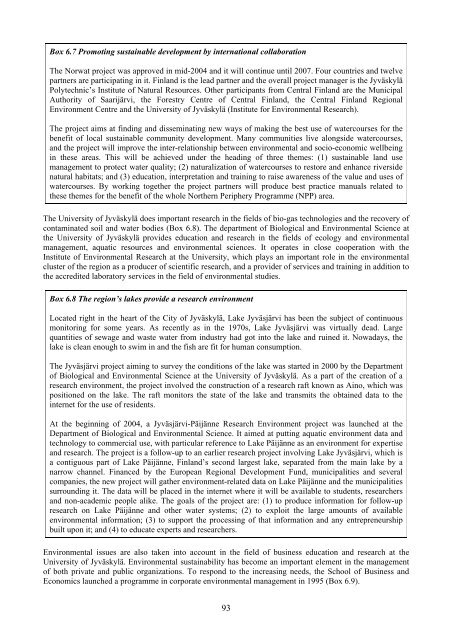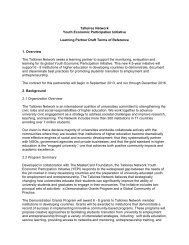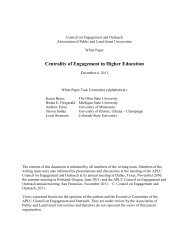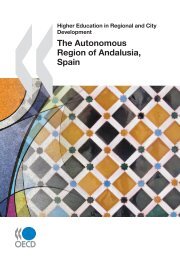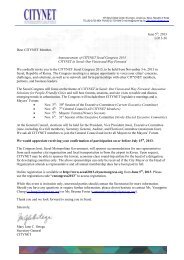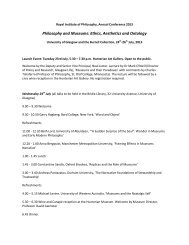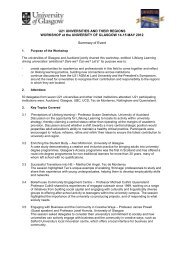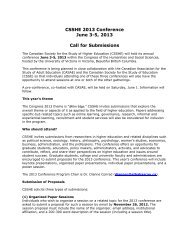Box 6.7 Promoting sustainable development by international collaborationThe Norwat project was approved in mid-2004 and it will continue until 2007. Four countries and twelvepartners are participating in it. <strong>Finland</strong> is the lead partner and the overall project manager is the JyväskyläPolytechnic’s Institute of Natural Resources. Other participants from Central <strong>Finland</strong> are the MunicipalAuthority of Saarijärvi, the Forestry Centre of Central <strong>Finland</strong>, the Central <strong>Finland</strong> <strong>Region</strong>alEnvironment Centre and the University of Jyväskylä (Institute for Environmental Research).The project aims at finding and disseminating new ways of making the best use of watercourses for thebenefit of local sustainable community development. Many communities live alongside watercourses,and the project will improve the inter-relationship between environmental and socio-economic wellbeingin these areas. This will be achieved under the heading of three themes: (1) sustainable land usemanagement to protect water quality; (2) naturalization of watercourses to restore and enhance riversidenatural habitats; and (3) education, interpretation and training to raise awareness of the value and uses ofwatercourses. By working together the project partners will produce best practice manuals related tothese themes for the benefit of the whole Northern Periphery Programme (NPP) area.The University of Jyväskylä does important research in the fields of bio-gas technologies and the recovery ofcontaminated soil and water bodies (Box 6.8). The department of Biological and Environmental Science atthe University of Jyväskylä provides education and research in the fields of ecology and environmentalmanagement, aquatic resources and environmental sciences. It operates in close cooperation with theInstitute of Environmental Research at the University, which plays an important role in the environmentalcluster of the region as a producer of scientific research, and a provider of services and training in addition tothe accredited laboratory services in the field of environmental studies.Box 6.8 The region’s lakes provide a research environmentLocated right in the heart of the City of Jyväskylä, Lake Jyväsjärvi has been the subject of continuousmonitoring for some years. As recently as in the 1970s, Lake Jyväsjärvi was virtually dead. Largequantities of sewage and waste water from industry had got into the lake and ruined it. Nowadays, thelake is clean enough to swim in and the fish are fit for human consumption.The Jyväsjärvi project aiming to survey the conditions of the lake was started in 2000 by the Departmentof Biological and Environmental Science at the University of Jyväskylä. As a part of the creation of aresearch environment, the project involved the construction of a research raft known as Aino, which waspositioned on the lake. The raft monitors the state of the lake and transmits the obtained data to theinternet for the use of residents.At the beginning of 2004, a Jyväsjärvi-Päijänne Research Environment project was launched at theDepartment of Biological and Environmental Science. It aimed at putting aquatic environment data andtechnology to commercial use, with particular reference to Lake Päijänne as an environment for expertiseand research. The project is a follow-up to an earlier research project involving Lake Jyväsjärvi, which isa contiguous part of Lake Päijänne, <strong>Finland</strong>’s second largest lake, separated from the main lake by anarrow channel. Financed by the European <strong>Region</strong>al Development Fund, municipalities and severalcompanies, the new project will gather environment-related data on Lake Päijänne and the municipalitiessurrounding it. The data will be placed in the internet where it will be available to students, researchersand non-academic people alike. The goals of the project are: (1) to produce information for follow-upresearch on Lake Päijänne and other water systems; (2) to exploit the large amounts of availableenvironmental information; (3) to support the processing of that information and any entrepreneurshipbuilt upon it; and (4) to educate experts and researchers.Environmental issues are also taken into account in the field of business education and research at theUniversity of Jyväskylä. Environmental sustainability has become an important element in the managementof both private and public organizations. To respond to the increasing needs, the School of Business andEconomics launched a programme in corporate environmental management in 1995 (Box 6.9).93
Box 6.9 Environmental management integrated in curriculumThe School of Business and Economics at the University of Jyväskylä has been proactive in integratingcorporate environmental management in its curriculum, research, and other activities. Master’s anddoctoral theses that include environmental considerations can be found from the beginning of the 1990s.A huge step forward was taken in 1995, when a new master’s program dedicated to environmental issueswas launched. This marked the beginning of the structured training in environmental sustainability at theSchool of Business and Economics. The programme in corporate environmental management providesan integrated and interdisciplinary approach to environmental issues having close co-operation with theDepartment of Biology and Environmental Sciences at the University and with the Renewable EnergyResearch Programme. Since 1995, there have been 46 completed master’s degrees and 8 doctoraldegrees. The number of students in the Master’s programme in 2004 was 53, and among them there werealso foreign students, as the teaching is given mainly in English.Jyväskylä was the first university in the whole of Scandinavia to offer a full master’s and doctoralprogramme in corporate environmental management. Recently, according to the Beyond Grey Pinstripessurvey 2005, conducted by WRI, the School of Business and Economics was positioned among the top30 business schools that lead the way in integrating issues of social and environmental stewardship intobusiness school curricula and research.The important regional research partners include the Jyväskylä Science Park (JOIN-project), the Central<strong>Finland</strong> Energy Agency (RePlan etc.), the Central <strong>Finland</strong> Environmental Agency, the Alliance ofCentral <strong>Finland</strong> and Jykes (Environmental Steps). The partners from trade and industry includeJyväskylä Energy, Nordea bank and a large number of SMEs from Central <strong>Finland</strong>, to mention just afew.The HEIs actively participate in the development of environmental technology in Central <strong>Finland</strong>, which hasbeen driven by the needs of the forestry, paper and metal industries. The focus areas are waste treatment andenvironmental biotechnology, process industry ecology, recovered and mixed fuels. Environmentalmanagement and measuring, and monitoring and analysis technologies are further fields of expertise. Inaddition to HEIs, the main actors in the environmental cluster comprise of the Jyväskylä Science Park, theTechnical Research Institute of <strong>Finland</strong> (VTT), and companies. Mustankorkea is the regional waste treatmentcompany in Jyväskylä, which has, in cooperation with the Department of Biology and EnvironmentalScience at the University of Jyväskylä, been acting as an experimentation site for research into landfilloperations and composting. VTT Processes, located in Jyväskylä, does research and development in thefields of environmental studies related to both the energy and forestry cluster. Environmental protectionauthorities in the region include the Central <strong>Finland</strong> Environment Centre and the Jyväskylä CityEnvironmental Agency.6.5 Conclusions: Critical points relating to the contribution to social, cultural and environmentaldevelopment1. Collaboration between HEIs. In contributing to social, cultural and environmental development,the collaboration and the division of work between HEIs is based on their complementary roles. Theoperations of the university usually have a strong research emphasis, whereas the actions of thepolytechnics emphasize a practical approach. These two different starting points form a goodfoundation for cooperation in socio-economic involvement. The exploitation of these possibilitiesvaries significantly between the different lines of action; the operations carried out are usually basedon mutual projects that are financed by regional development funds. This kind of project-baseddevelopment often lacks continuity and easily leads too incoherence and inefficiencies in theimplementation of the development activities. The collaboration between HEIs in local socioeconomicdevelopment forms a significant challenge, which has partly been responded to by themutual regional development strategy of the HEIs. However, a more comprehensive, consistent andconcrete strategy for the development of the local socio-economic environment would take thecontribution of the HEIs to a new level.94
- Page 1 and 2:
OECD/IMHE ‐ Supporting thecontrib
- Page 3 and 4:
SUMMARYTogether with 13 other regio
- Page 5 and 6:
8.2 Increasing the regional effecti
- Page 7 and 8:
I INTRODUCTION1.1 Strengthening the
- Page 9 and 10:
development. The aim is that region
- Page 11 and 12:
The self-evaluation considered here
- Page 13 and 14:
densely populated cities in Finland
- Page 15 and 16:
1,9 %1,7 %1,5 %1,3 %Population chan
- Page 17 and 18:
The share of jobs in primary produc
- Page 19 and 20:
New pillars of future’s developme
- Page 21 and 22:
Jyväskylä0,60,91,11,0Central Finl
- Page 23 and 24:
2.4 Governance StructureMunicipalit
- Page 25 and 26:
of its development outside the cent
- Page 27 and 28:
III CHARACTERISTICS OF THE HIGHER E
- Page 29 and 30:
continuing education and open unive
- Page 31 and 32:
The Science and Technology Policy C
- Page 33 and 34:
3.2 Regional dimension within the n
- Page 35 and 36:
order to respond to the challenges
- Page 37 and 38:
14001200Master's degreesDoctoratesN
- Page 39 and 40:
900800Youth graduatedAdult graduate
- Page 41 and 42:
provide information for the basis o
- Page 43 and 44: CabinetParliamentSTPCSteering (andf
- Page 45 and 46: 5,04,0Billion euros3,02,01,00,083 8
- Page 47 and 48: The number of refereed articles is
- Page 49 and 50: Centre of expertisePaper industryBi
- Page 51 and 52: The Institute for Environmental Res
- Page 53 and 54: and systematic gradually progressin
- Page 55 and 56: are seen to be very important chann
- Page 57 and 58: Internal support units of HEIsThe F
- Page 59 and 60: of interviewed HEI staffs, the coop
- Page 61 and 62: areas of the region’s Centre of E
- Page 63 and 64: system of Jyväskylä and the HEIs
- Page 65 and 66: V CONTRIBUTION OF TEACHING AND LEAR
- Page 67 and 68: esources to establish new activitie
- Page 69 and 70: The main problem for the Finnish la
- Page 71 and 72: longer. 2.5% of the Jyväskylä Pol
- Page 73 and 74: activities. As a part of the new qu
- Page 75 and 76: education programmes consisting of
- Page 77 and 78: the TE-Centre of Central Finland an
- Page 79 and 80: practices in the provision of educa
- Page 81 and 82: Reason forskillupgradingDescription
- Page 83 and 84: Strengths+ HEIs are actively confro
- Page 85 and 86: taxation, to lower the unemployment
- Page 87 and 88: Box 6.2 The WIRE -projects: Support
- Page 89 and 90: indoor ice-skating rink, the Rauhal
- Page 91 and 92: The School of Cultural Studies at t
- Page 93: the number of registered customers
- Page 97 and 98: Strengths+ The significance of HEIs
- Page 99 and 100: eferring to the regional developmen
- Page 101 and 102: Key topics relating to changes in t
- Page 103 and 104: participation in the decision makin
- Page 105 and 106: in the strategy-making process. The
- Page 107 and 108: 7.5 Critical points in promoting th
- Page 109 and 110: 7.Cooperation in strategies concern
- Page 111 and 112: egion is according to national and
- Page 113 and 114: oundaries for further developmental
- Page 115 and 116: joining resources and operations by
- Page 117 and 118: Discussion proposal 15: To ensure d
- Page 119 and 120: achieved by the horizontal utilizat
- Page 121 and 122: Appendix 2 Information on data used
- Page 123 and 124: and finding synergy between the oth
- Page 125 and 126: School of BusinessRoleThe School of
- Page 127 and 128: The challenge of the school from re
- Page 129 and 130: developing wellness and environment
- Page 131 and 132: Faculty of EducationRoleThe Faculty
- Page 133 and 134: and/or graduation thesis is a signi
- Page 135 and 136: Areas of strength and prioritising
- Page 137 and 138: Agora Center’s partners from the
- Page 139 and 140: Currently the priority of ITRI’s
- Page 141 and 142: Weak spots and areas to develop in
- Page 143 and 144: Employment and Economic Development
- Page 145 and 146:
Appendix 3 Analysis of the most sig
- Page 147 and 148:
Appendix 4 Regional effects (input-
- Page 149 and 150:
The overall value of production cre
- Page 151 and 152:
Appendix 5 Reform of regional struc
- Page 153 and 154:
Appendix 7 Provision of education i
- Page 155 and 156:
Appendix 8 Statistical information
- Page 157 and 158:
Appendix 10 Statistics on financing
- Page 159 and 160:
Appendix 12 Labour market activity
- Page 161 and 162:
Appendix 14 Master’s Programmes a
- Page 163 and 164:
Uusiutuvan energian tutkimusohjelma
- Page 165 and 166:
BIBLIOGRAPHYAcademy of Finland (200


